OWC Mercury Aura Pro Express 6G Review: A Fast MacBook Air SSD Upgrade
by Anand Lal Shimpi on November 9, 2011 4:18 PM ESTI've written previously about the SSD lottery you play when you buy a new MacBook Air. As with many commodity components, Apple sources its SSDs from two sources. For now, that appears to be Toshiba and Samsung. Apple tends to pick suppliers that can deliver a reliable product in the quantities it's interested in. In the storage space at least, Apple doesn't seem to be overly concerned with performance but rather making sure the solution works.
A year ago, the Toshiba and Samsung controllers offered fairly similar performance. These days the same isn't true. While Samsung has updated its controllers, Toshiba's solution still offers the fairly abysmal random write performance it did a year ago. With the recent release of the Samsung SSD 830, I expect the trend of Samsung drives increasing in performance will continue next year as well.
Unlike the rest of Apple's notebook lineup however, it's not so easy to just swap in a higher performing (or larger capacity) SSD in your MacBook Air. The very first MBAs used a PATA LIF connector, a rarity on most drives. Apple eventually transitioned to a SATA LIF connector, and then with the release of the 2010 MacBook Air we encountered a new thin form factor SSD with a custom interface connector. In all of those cases, the market for third party MacBook Air SSDs popped up at some point post-launch. The 2010/2011 MacBook Air has been no different.
If you've followed the aftermarket Mac support business then OWC should be no stranger to you. If you haven't heard of OWC from their Mac efforts, there's always the fact that second to only OCZ, no one has been quicker at releasing SSDs based on brand new SandForce controllers.
OWC put out an aftermarket drive for owners of 2010 MacBook Airs based on the 3Gbps SF-1200 controller. For 2011 MBA owners there's a 6Gbps SF-2281 option: the OWC Mercury Aura Pro Express 6G.
The drive is available in 120GB and 240GB capacities, for $280 and $550 respectively. Both drives come with pentalobe and torx drivers to aid in opening your MBA and replacing your old drive.
For another $35 OWC will sell you an external USB 2.0/3.0 enclosure that can house your old MBA SSD either to help you transfer your data or give you a sweet, high performance external drive once you're done.
OWC sent me a 240GB Aura Pro, which I installed into an 11-inch MacBook Air. The installation process was a cinch. The only hiccup was that I couldn't just clone my 256GB Toshiba SSD using Disk Utility since the Aura Pro was technically smaller. Instead I used Lion's internet recovery to download and install a fresh copy of OS X, before restoring my data and installing benchmarks.
If you've followed our SSD reviews you'll know what to expect next. SandForce's SF-2281 controller is the fastest option on the market today, while the Toshiba controller Apple uses is pretty much on the opposite end of the spectrum. I ran our standard four-corners Iometer test to put into perspective just how much faster the OWC upgrade is:
| 2011 MacBook Air SSD Performance Comparison | ||||||
| 4KB Random Write (8GB LBA Space, QD3) | 4KB Random Read (QD3) | 128KB Sequential Write | 128KB Sequential Read | |||
| OWC Mercury Aura Pro Express 6G | 88.4 MB/s | 30.4 MB/s | 495.1 MB/s | 451.4 MB/s | ||
| 13-inch MacBook Air (Mid 2011) - Toshiba SSD | 1.65 MB/s | 18.0 MB/s | 204.2 MB/s | 189.5 MB/s | ||
| 11-inch MacBook Air (Mid 2011) - Samsung SSD | 27.2 MB/s | 44.6 MB/s | 258.0 MB/s | 234.4 MB/s | ||
| 11-inch MacBook Air (Late 2010) - Toshiba SSD | 2.49 MB/s | 31.1 MB/s | 147.0 MB/s | 113.0 MB/s | ||
Performance is just staggering. The comparison is borderline unfair because both the Samsung and Toshiba controllers Apple uses in its MacBook Air are really a generation old at this point, while the Mercury Aura Pro Express is the absolute latest and greatest 6Gbps solution SandForce offers. The performance advantage is noticeable. The upgrade does make everything feel snappier, particularly compared to a MBA equipped with a Toshiba SSD. Large file transfers complete quicker and heavy multitasking workloads see an improvement as well.
SandForce achieves this performance advantage by using real time compression and data deduplication algorithms to reduce the amount of data actually written to the NAND. Since much of what we write to our drives in the course of normal use is easily compressible data, SandForce's technology is quite effective. Where the controller falls short however is if you're moving incompressible data, for example already highly compressed videos or encrypted data. While highly compressed content like H.264 movies will really only impact sequential read/write speed, enabling full disk encryption under OS X impacts all of your data. Truly random data is impossible to compress/dedupe, so I enabled FileVault under Lion and re-ran our performance tests on the Aura Pro:
| 2011 MacBook Air SSD Performance Comparison | ||||||
| 4KB Random Write (8GB LBA Space, QD3) | 4KB Random Read (QD3) | 128KB Sequential Write | 128KB Sequential Read | |||
| OWC Mercury Aura Pro Express 6G | 88.4 MB/s | 30.4 MB/s | 495.1 MB/s | 451.4 MB/s | ||
| OWC Mercury Aura Pro Express 6G (Encrypted) | 80.8 MB/s | 28.8 MB/s | 184.8 MB/s | 431.9 MB/s | ||
| Apple Toshiba SSD (Encrypted) | 1.13 MB/s | 19.4 MB/s | 178.7 MB/s | 195.8 MB/s | ||
Sequential write performance takes a pretty significant hit, but the rest of the metrics look ok. In fact, I'd say even if you're running with your drive encrypted you'll have a better experience on the OWC drive than with either of the Apple SSDs.
With the OWC Mercury Aura Pro Express 6G you get much better performance than the stock Apple SSDs regardless of usage. Is there any downside to going with the aftermarket drive? Unfortunately there appears to be one:
| Power Consumption Comparison | ||||
| Idle | Load (Sequential Write) | |||
| OWC Mercury Aura Pro Express 6G | 6.2W | 19.0W | ||
| OWC Mercury Aura Pro Express 6G (Encrypted) | 6.2W | 18.0W | ||
| Apple Toshiba SSD | 5.5W | 16.4W | ||
It's natural for the OWC solution to draw more power under load, you're getting over twice the performance so the increase in power draw is actually not an issue (better power efficiency since you'll be at idle quicker than with a stock SSD). The bigger concern is what happens at idle. My 11-inch MacBook Air typically idles at 5.5W, swapping in the OWC drive increased that idle power consumption to 6.2W. Now this is measured at the wall, so it takes into account AC adapter inefficiency. The actual impact at idle should be somewhere in the 300mW - 400mW range. For a mostly idle workload you'd probably see a 30 minute reduction in battery life.
Final Words
The OWC Mercury Aura Pro Express 6G is a well executed SSD upgrade for 2011 MacBook Air owners. You get an absolutely huge performance increase and an option for users who want the entry level 2011 MBAs but with a larger capacity SSD. If your MacBook Air is your primary workhorse, perhaps even your desktop replacement, and you got stuck with a Toshiba SSD the OWC option makes a lot of sense. OWC thankfully provides everything you need in the box to get into your MacBook Air and swap drives.
The downside is power consumption. At idle the SandForce controller simply draws more power than the Toshiba controller in the MBA we tested. The overall impact on battery life won't be tremendous (perhaps 5% on a mostly idle workload), but if you're already on the edge of usability with the battery life from your stock MacBook Air you may want to remain stock.


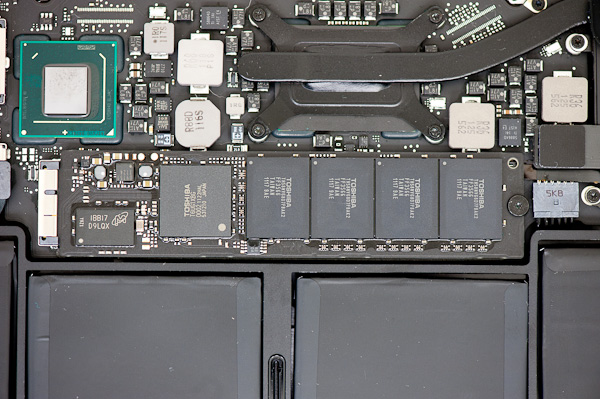
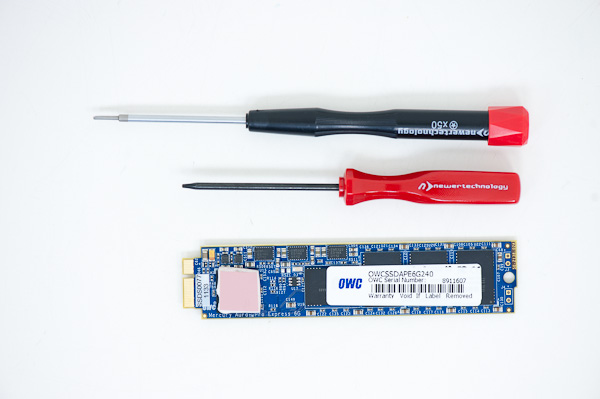






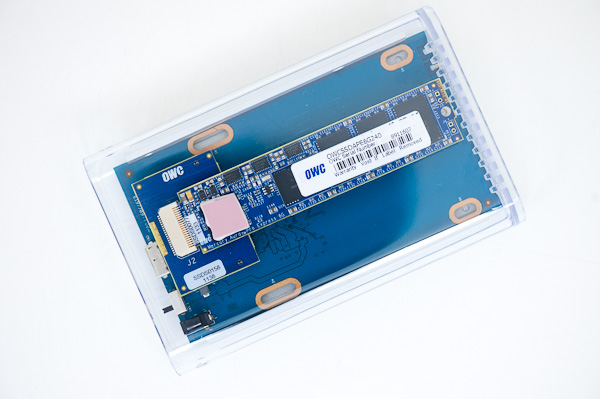
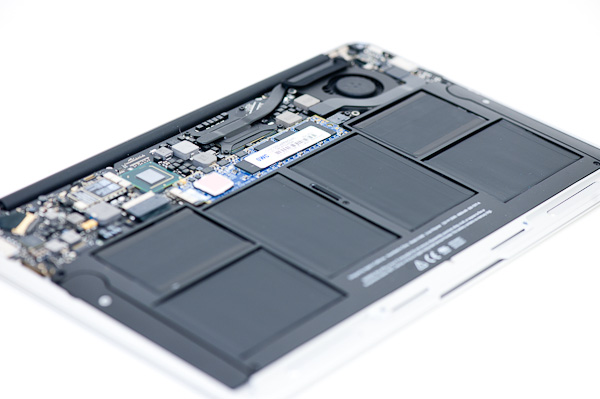
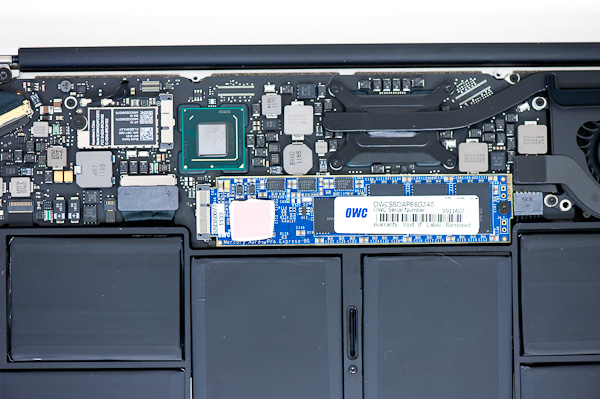








39 Comments
View All Comments
taltamir - Thursday, November 10, 2011 - link
The toshiba SSD is just barely faster than a HDD. Users are getting shafted as they thing they are getting a real SSD.ezorb - Wednesday, November 9, 2011 - link
No one buys an AIR because its fast, its not! people buy it because its shiny and small. (and it very good at both of those function)Also it seams stupid to throw out a validated design and replace it with and after market solution with known firmware issues? and to what end? shave a quarter second off word document load time?
the only reason to buy this product is to increase capacity by more then double, that is the only good reason to buy this product.
solipsism - Wednesday, November 9, 2011 - link
These ultraportables boot up in 10 seconds and awake from hibernation in 1. Seems to me they more than responsive for most consumer's needs, especially if we're talking about drive access when most are coming from HDDs.futurepastnow - Thursday, November 10, 2011 - link
That responsiveness is, indeed, the reason for consumer SSDs. Much of the speed of these drives is only valuable to server and workstation-y tasks, but everyone can appreciate their programs opening almost instantly.Given that, I'm not sure it's worthwhile to upgrade a Macbook Air just for speed. The stock SSD is so much quicker than a hard drive that it's probably "fast enough" from a responsiveness angle.
Ratman6161 - Thursday, November 10, 2011 - link
....as it is knowing that there was a better option out there but you didn't get it just because by sheer luck you got the Toshiba rather than the Samsung.BrianTho2010 - Wednesday, November 9, 2011 - link
The firmware issue was fixed in the latest update. I can confirm this with my Vertex 3 that had daily blue screens and lock ups.The Air, and Ultrabooks in general, are a great solution for someone needed a super portable notebook that they can do all of their day to day tasks on without sacrificing much performance compared to a full sized 15" notebook. When you introduce a great SSD like the SandForce solutions, you make the gap between UltraBook & Notebook performance even smaller.
Lastly, this product is NOT for your average Air buyer. You have to actually open the product to install. 98% of notebook/ultrabook/netbook owners do not feel comfortable opening their computer.
Beenthere - Thursday, November 10, 2011 - link
ONE firmware issue was fixed with the last update. We don't know how many more firmware updates will be required for true reliability and compatibility.ciparis - Wednesday, November 9, 2011 - link
That was the thinking last generation. Now the Air lineup is a great choice for plenty of reasons: it's the thinnest, lowest-price, AND is the only line ditching unacceptably slow spindle drives across the board. SSDs make a bigger impact compared to a spindle drive than getting a somewhat faster CPU does, unless you're constantly CPU-bound (most aren't).That said, once you have an SSD, the contrast between a slow and a faster SSD pales compared to not having an SSD at all. So it's still tough to argue for the upgrade, from that point of view... at least if you have the Samsung.
Mitch89 - Thursday, November 10, 2011 - link
It's obvious you haven't used the latest generation Air, its performance is excellent. It's even more impressive when you consider just how compact the machine is, and the battery life.ckryan - Wednesday, November 9, 2011 - link
I don't own any OWC stuff; They once claimed that their 2281s were impervious to the 2281 issues because they had built in special optimizations. As it turns out, there aren't really that many differences between an OWC 2281 and a Patriot/Mushkin/etc 2281. They look the same, get made in the same place, and use the same firmware. I thought that was a little ridiculous.The good news is that it really does seem as if the second generation SFs are operating as they were intended. My Mushkin Chronos Deluxe which suffered two types of SF "BSoD"s was fixed by 3.3.2. After the first couple crashes, I had moved the drive to a secondary, non boot position, where the drive would crash every thirty hours for the two months I'd had the drive (it was running 24/7). It happened like clockwork, regardless of motherboard -- H67,P67, and Z68. I grabbed the 3.3.2FW and it's been running for two weeks straight.